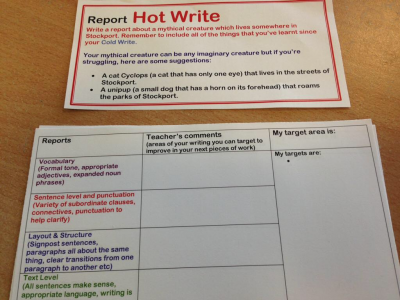Literacy
We aim to inspire our children in their use of language, and provide them with a wide range of purposeful experiences so that they will become fluent, imaginative readers and writers. Whilst the teaching methodologies change as the children move up through school, there is a shared fundamental belief that children’s use of language develops most effectively when they are engaged in collaborative, meaningful learning experiences and are provided with meaningful feedback about the success of their work.
Early Learning Experiences
The children begin this journey in the informal setting of the Foundation Stage, where they take part in a range of high quality tasks relating to speaking, listening and developing language. Role play areas are used to facilitate creative play, and tasks are designed so that children are exposed to high quality talk. As children progress to KS1 they are introduced to Rocket Phonics, a systematic synthetic phonics programme. This will help to prepare them for the compulsory ‘Phonic Screening’ test at the end of year 1.
Writing

In KS1 and KS2, the children receive daily literacy lessons in which they will learn to become fluent writers. Bradshaw Hall are proud to boast writing results that have been significantly above the national average in recent years. This success has stemmed from our deployment of a writing model which involves:
- A Cold Write: A piece of writing inspired by an exciting stimulus (a video clip or engaging picture) based on a specific genre which is explored through collaboration with peers. This is largely a diagnostic tool for teachers to establish bespoke lessons leading up to the next independent piece of writing.
- A Warm Write: After several lessons based on individualised targets, children have a Warm Write centred on the similar if not the same stimulus from their Cold Write. This allows the children to see the progress they have made against their targets from their Cold Write. After their Warm Write, children receive detailed feedback that provides them with ‘Next Steps’ as well as an opportunity to reflect and improve specific elements of their writing.
- A Hot Write: After further objectives are explored as a result of the information gleaned from the Warm Write, children produce a final piece of writing that is then reflected, edited and improved upon.
At the heart of this model are the inspiring lessons taught in between each of the ‘Writes’ that aim to embed children’s understanding of National Curriculum literacy objectives as well as key grammar and punctuation objectives. These lessons aim to inspire children and provide them with a love of language and literature. Furthermore, we aim to provide children with spiritually uplifting moments when they reflect on the progress they have made through the cycle.
In KS1 we employ the ‘talk 4 writing’ principles to expand vocabulary and embed story content and structure.
Reading
Phonics
Children are taught systematic synthetic phonics using the Department of Education validated Rocket Phonics programme. Children in Reception and Year 1 have five structured phonics sessions each week as well as additional dedicated reading sessions. They also have regular opportunities to hear and discuss stories, poetry and information texts read to them to ensure they develop a love of reading.
Children’s Reading Planet home readers focus on sounds that have been taught in class and with which the children are secure. In class we use Target Practice Readers to specifically focus on the most recently secured sounds. We also carefully select books from high quality schemes to ensure a breadth of text types and stories.
In the Summer Term in Year 1 children take the Phonics Screening Check, this is a phonics based check where the children will be expected to read 40 simple, de-codable words including nonsense words. This is a progress check to identify those children not at an expected level in their reading. The results will be reported to parents. Children who do not pass the test in Year 1 are given additional support in Year 2.
Where necessary, children have additional 1-to-1 reading sessions as well as personalised programs such as Boosting Reading @ Primary.
During sessions in the Autumn term, Reception and Year 1 parents are invited to attend information evenings to explain the teaching of phonics and receive guidance on how best to support their children at home.
Reading Discovery
Children from Years 2 - 6 follow the school’s Reading Discovery model which is the primary vehicle for teaching comprehension skills.
Each term, each year group explores one key theme through a class novel, non-fiction texts, poetry and other text types such as song lyrics. Examples of the themes include 'Life and Death,' 'Friendships' and 'Climate Change.'
Each text or chapter is explored for 30 minutes 4 days a week and follows the structure below:
Day 1- Shared reading and recording initial thoughts and questions
Day 2- Vocabulary work
Day 3- Activity related to a particular VIPERS objective (vocabulary, infer, predict, explain, retrieve, summarise)
Day 4- VIPERS assessment questions
At the end of the term the theme is consolidated and linked to a school value: Successful Learners, Responsible Citizens, Confident Individuals.
Where necessary, children are supported with extra sessions to read the focus chapter/text. They may also receive a Boosting Reading @ Primary intervention.

